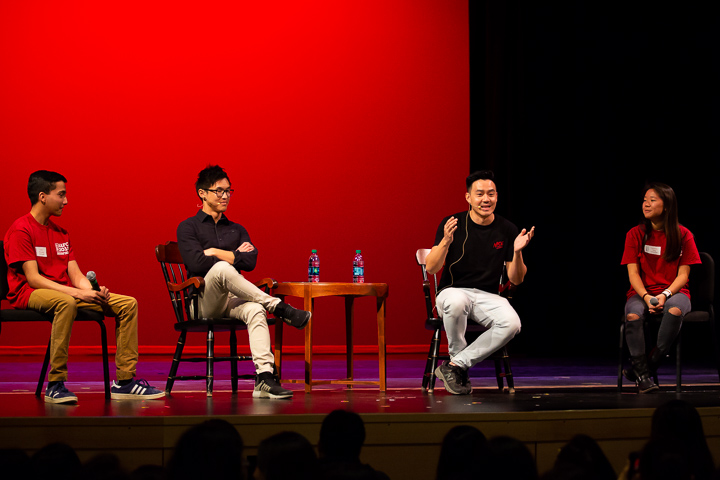On Apr. 8, more than 400 high school students came to Deerfield for the annual Asian American Footsteps Conference. Founded over ten years ago by educators in Boston, the conference opened up an opportunity for Asians, Asian-Americans, and mixed-heritage Asian students to connect with others who share their similar yet unique heritage, experiences, and cultures.
The main event of the day was a keynote speech presented by Wesley Chan and Phillip Wang, co-founders of an Asian-American film company called WongFu Productions.
The pair has a YouTube channel with over three million subscribers, and has created several short films and music videos. Students were able to meet the pair.
Discussing their work overall, Chan explained, “We’re not the weak ones or the passive ones, and we don’t all know kung-fu. We want to show that Asians are just normal guys.”

Credit: Deerfield Academy Flickr
Wang focused on the specific keynote speech that he and Mr. Chan gave at the conference, stating, “First and foremost, we do want to inspire people to be creative. We hope to encourage people to keep exploring what they’re passionate about. It can even start off with making silly videos for fun. Creating a bigger footprint for Asian-Americans … I think that’s what we want to instill.”
Following the keynote speech, students attended an array of workshops to discuss topics ranging from how Western beauty standards impact Asian-American feminism to the intersections of the Asian or Asian-American community and the LGBTQ+ community. Presenters varied from high school students with powerful ideas and stories to share to professionals with years of knowledge on their topic.
When discussing the impact the conference had on the students attending, ASA officer Lynnette Jiang ’18 stated, “[The conference was] a way for Asians to share their common struggles and experiences with one another … [We] got to hear about all their different stories over the years… and share and help each other with [our] experiences.” The conference offered a chance for Asian students to connect with peers who face similar challenges and to build friendships to help support one another at their separate schools.
However, as the Office of Inclusion emphasized the importance of cultural competency with the “Cross the Valley” Campaign, many on campus worried that the seemingly exclusive nature of the AAFC appeared to be a step backwards in Deerfield’s goal of understanding and listening to different cultures. Part of Deerfield’s mission statement states that Deerfield is a “vibrant, ethical community that embraces diversity.” Thus, many wondered if the conference, created by Asians, for only Asians, abides by the Academy’s strong belief in the importance of inclusion.

Credit: Deerfield Academy Flickr
When explaining the rationale behind the exclusiveness of the conference, Director of Alumni and Parent Engagement Jenny Hammond, who was the head coordinator of the conference, said, “[It is sometimes important] to have a space just for people who can relate to each other without having to explain a whole lot. In mixed company you have to explain why you do certain things. That kind of space [the conference offers], especially when you’re underrepresented, can be really valuable.”
Asians, Asian-Americans, and mixed-heritage Asians, being a minority at most independent secondary schools, may not have as many chances to be surrounded by peers with common backgrounds and the struggles and experiences that emerge from their shared heritage. Even though independent high schools in New England have become increasingly diverse in recent years, the conference has adhered to the strict parameters of who can or cannot attend the conference for over ten years.
The stated intention of the AAFC was not to exclude people from the conversation, but rather to carve out a separate space where people with similar backgrounds can network and share experiences and hardships without having to climb over cultural gaps. “Both are really important,” Ms. Hammond explained. “We have to, at some point, bring the rest of the people in and to communicate across cultural differences, but it’s also important to support and foster people who might feel they’re only a small minority.”
However, many students feel that Deerfield still has a long way to go to create a fully inclusive community. Being culturally competent requires one to be willing to study, learn, and listen to the stories of different people. Ms. Hammond reflected, “Accept their truth, because when you get to know someone who has a completely different experience from you, it’s really eye-opening and it’s important to realize that.”

